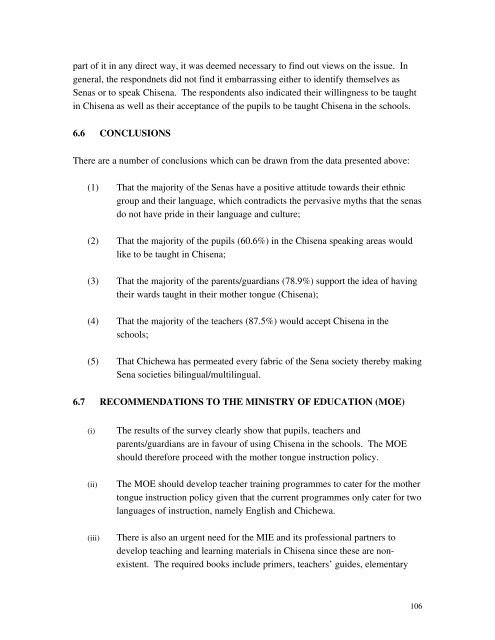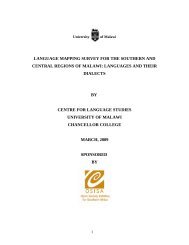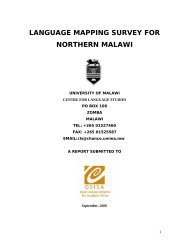SOCIOLOLINGUISTIC SURVEYS - Centre for Language Studies
SOCIOLOLINGUISTIC SURVEYS - Centre for Language Studies
SOCIOLOLINGUISTIC SURVEYS - Centre for Language Studies
Create successful ePaper yourself
Turn your PDF publications into a flip-book with our unique Google optimized e-Paper software.
part of it in any direct way, it was deemed necessary to find out views on the issue. In<br />
general, the respondnets did not find it embarrassing either to identify themselves as<br />
Senas or to speak Chisena. The respondents also indicated their willingness to be taught<br />
in Chisena as well as their acceptance of the pupils to be taught Chisena in the schools.<br />
6.6 CONCLUSIONS<br />
There are a number of conclusions which can be drawn from the data presented above:<br />
(1) That the majority of the Senas have a positive attitude towards their ethnic<br />
group and their language, which contradicts the pervasive myths that the senas<br />
do not have pride in their language and culture;<br />
(2) That the majority of the pupils (60.6%) in the Chisena speaking areas would<br />
like to be taught in Chisena;<br />
(3) That the majority of the parents/guardians (78.9%) support the idea of having<br />
their wards taught in their mother tongue (Chisena);<br />
(4) That the majority of the teachers (87.5%) would accept Chisena in the<br />
schools;<br />
(5) That Chichewa has permeated every fabric of the Sena society thereby making<br />
Sena societies bilingual/multilingual.<br />
6.7 RECOMMENDATIONS TO THE MINISTRY OF EDUCATION (MOE)<br />
(i)<br />
The results of the survey clearly show that pupils, teachers and<br />
parents/guardians are in favour of using Chisena in the schools. The MOE<br />
should there<strong>for</strong>e proceed with the mother tongue instruction policy.<br />
(ii)<br />
The MOE should develop teacher training programmes to cater <strong>for</strong> the mother<br />
tongue instruction policy given that the current programmes only cater <strong>for</strong> two<br />
languages of instruction, namely English and Chichewa.<br />
(iii)<br />
There is also an urgent need <strong>for</strong> the MIE and its professional partners to<br />
develop teaching and learning materials in Chisena since these are nonexistent.<br />
The required books include primers, teachers’ guides, elementary<br />
106





